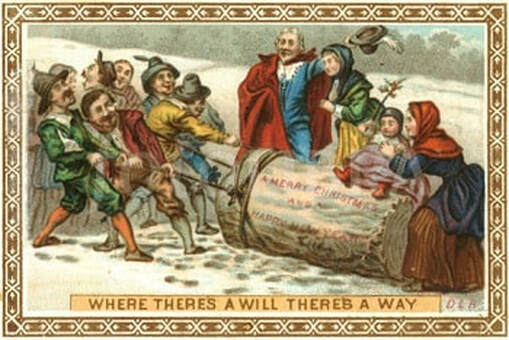Yule, Yuletide
 This year, the Yule season or Yuletide, is from 21 December to 1 Jan 2022. Yule is said to be one of the oldest traditional celebrations in Northern Europe.
This year, the Yule season or Yuletide, is from 21 December to 1 Jan 2022. Yule is said to be one of the oldest traditional celebrations in Northern Europe.The word Yule and the meaning and practices of Yule have distant origins which can be traced back to the traditions of ancient Proto-Indo-European (PIE) peoples.
The English word yule is from Old English geol, geola (Christmas Day, Christmastide) and is related to Old Norse jol (a traditional feast taken over by Christianity). Some sources suggest that Old Norse jol was borrowed by Old French to become jolif which later became the word jolly (which originally meant festive); however, other sources beg to disagree.
Another related word, giuli (an Anglian form of Old English) was the Anglo-Saxon name for a two-month midwinter season corresponding to Roman December and January.
Some sources suggest that when the ancient Proto-Indo-Europeans migrated into what is now Scandinavia about 4,000 years ago, they displaced or became integrated with the original aboriginal peoples of the area. One theory suggests that one of the aboriginal words which was taken into the PIE language was Yehwla, the name for the midwinter solstice, a word which, perhaps not coincidentally, is also the Proto-Germanic word thought to be the source of Old Norse jol. Some theories suggest that the word Yehwla comes from the Old Norse god Odin who is also known by the name Jolnir (the yule one).
So, there are many theories for the ancient origins of the word Yule—all interesting in themselves but none that are known for certain.
As Anglo-Saxon English became Christianized, the word Yule came to mean the twelve-day feast of the Nativity which began on 25 December. By the 11th century, the word Christmas replaced Yule except for places in northeast English where the predominant Danish settlers continued to use the word Yule.
The word Yuletide is from the late 15th century. The first reference to a Yule log is from the 17th century. The word Yule in reference to Christmas was revived in England in the 19th century.
Yule logs and yule log cakes?
Traditionally, families would put one end of a very large log into the household fireplace and keep it burning during the 12 days of Christmas. As this tradition became increasingly impractical, families turned instead to the production of yule log cakes which I suspect most would agree is a much better (and tastier) idea.
Reference: Online Etymological Dictionary, https://www.etymonline.com/
https://en.wikipedia.org/wiki/Yule
Kaldera, R. Yule is not the wheel. (Thank you for this, Alice!).
Published on December 21, 2021 07:45
No comments have been added yet.



